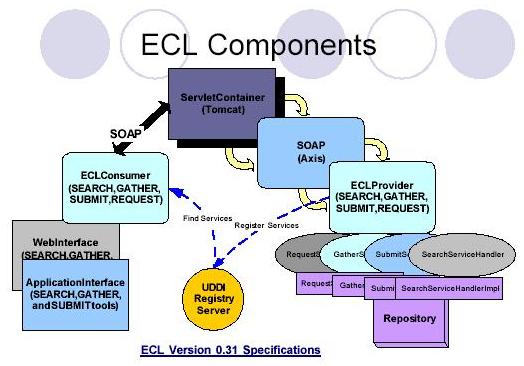ECL
EduSource Communication Language
A language is a human communication protocol, which allows two or more people to understand each other. EduSource Communication Language (ECL) protocol is the language for all eduSource members connected to a heterogeneous network. It consists of institution repositories, peer-topeer network, individual small repositories, and application interfaces. The institution repositories such Explora, Aloha, and Careo are stable eduSource members. Typically, the institution repositories have known URL and Web servers running at all times. These repositories already offer their services through their own protocol either via HTTP or XMLRPC requests. ECL protocol enables these repositories to communicate with each other and enables other repositories and services to become a part of eduSource. The protocol is independent from any existing protocols and enables developers to build universal tools and services that will enable their users to connect and use services provided by any repository connected to the eduSource network.
The ECL implements the IMS Digital Repository Interoperability specification. lt follows closely IMS DRI and models its messaging protocol according to IMS DRI general messaging model.
Since the complexity of the ECL protocol might be detrimental to its adoption, an eduSource connector which implements the ECL protocol is provided. The connector provides a standard API to connect existing repository to the eduSource network. ECL protocol requires institution repositories or tools to implement connector handlers only for those services they want to expose to others (Figure 2), which is a far simpler than implementing and deploying every service in each institution. The connector also facilitates version synchronization during the protocol evolution. Changes in the protocol itself rarely propagate to the API level. In most cases, repositories do not have to worry about the change in the protocol, they only need to update the connector with a never version. Changes in the ECL protocol are detected by the newer version of the connector and are dealt with automatically.
- L1. Communication protocol (HTTP, SOAP, XML-RPC, Peer-to-peer, etc.)
- L2. Communication language (ECL, OAI, POOL, etc)
- L3. Metadata (IMS, CanCore, Dublin core)
- L4. Ontologies (vocabularies for metadata)
Four levels can be differentiated:
| ECL Service Description | |
| Search |
Search is a SOAP service implemented at service provider (server) computers. As recommended by IMS DRI, ECL protocol uses XQuery. To enable connection of the repositories that do not support (full) XQuery a set of XQuery templates is used. The repositories register their Search Service with an indication of supported templates or full XQuery search capability. |
| Expose |
Expose is a SOAP service implemented on client computers. When asynchronous messaging is required, this service will be called by service providers to return the responses for search, gather, and alert. |
| Submit |
Submit is a SOAP service implemented at service provider (server) computers. It is a function for moving an object (metadata and learning object) to a repository. Clients can make request to this service to determine the type of transfer protocol. The transfer protocol can be a successive SOAP request to upload the object or FTP transfer protocol. |
| Store |
Store is a SOAP service implemented on client computers. When asynchronous messaging is required, this service is called by service providers to return the results of submit function. Request is a SOAP service implemented at service provider (server) computers. It provides a function to ask to deliver objects to a client. The transfer protocol could be a successive SOAP request to download the object or FTP transfer protocol. |
| Request |
Request Request is a SOAP service implemented at service provider (server) computers. It provides afunction to ask to deliver objects to a client. The transfer protocol could be a successive SOAP request to download the object or FTP transfer protocol. |
| Deliver |
Deliver is a SOAP service implemented on client computers. When asynchronous messaging is required, this service will be called by service providers to return the chunked of results. |
| Gather |
Gather is a SOAP service implemented at service provider (server) computers. Repositories wanting to provide gather service must implement gather service handler. |
| Gateway gather |
Gateway gather is a type of gather service. It allows EduSource members to make gathee requests to repositories external to eduSource. By default, the results are converted to IEEE LOM format or alternatively they remain in the format used in external repository Gateway gather service providers must specify a repository type and protocol (e.g. OAI). |
